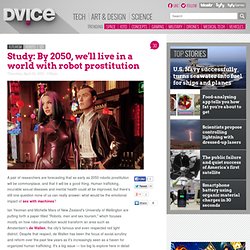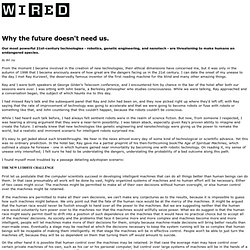

23 incredible new technologies you’ll see by 2021. Study: By 2050, we'll live in a world with robot prostitution. A pair of researchers are forecasting that as early as 2050 robotic prostitution will be commonplace, and that it will be a good thing.

Human trafficking, incurable sexual diseases and mental health could all be improved, but there's still one question none of us can really answer: what would be the emotional impact of sex with machines? Ian Yeoman and Michelle Mars of New Zealand's University of Wellington are putting forth a paper titled "Robots, men and sex tourism," which focuses mostly on how robo-prostitution would transform an area such as Amsterdam's de Wallen, the city's famous and even respected red light district.
Despite that respect, de Wallen has been the focus of social scrutiny and reform over the past few years as it's increasingly seen as a haven for organized human trafficking. It's a big issue — too big to explore here in detail — and has forced the closure of some of the area's best known sex clubs. (If you're curious, this is a good place to start.) 2020: a look forward to the promises of a truly amazing year. Posted on 28. Apr, 2011 by admin in Future Get ready for the first complete synthetic human brain, moon mining, and much more Future Cities! In the year 2020, cars will fly, cities will power themselves with sunlight, biofuels, and minerals mined from the moon, computers will be more powerful than the human brain, and everything will be a touchscreen!
Perhaps. Robotic moon bases, chips implanted in our brains, self-driving cars, and high-speed rail linking London to Beijing. 2020, of course, is just a convenient target date for roughly-ten-years-off predictions. After spending decades helping various top-tier tech companies develop and deploy their cutting edge technologies around the world, Liebhold now helps clients take a long view of their businesses so they can make better decisions in the short term. "We help people think systematically about the future," Liebhold says. In other words, the year 2020 (and 2019, and 2021) is Liebhold’s business. And what won’t happen?
“No. Wired 8.04: Why the future doesn't need us. Why the future doesn't need us.

Our most powerful 21st-century technologies - robotics, genetic engineering, and nanotech - are threatening to make humans an endangered species. From the moment I became involved in the creation of new technologies, their ethical dimensions have concerned me, but it was only in the autumn of 1998 that I became anxiously aware of how great are the dangers facing us in the 21st century. I can date the onset of my unease to the day I met Ray Kurzweil, the deservedly famous inventor of the first reading machine for the blind and many other amazing things. Ray and I were both speakers at George Gilder's Telecosm conference, and I encountered him by chance in the bar of the hotel after both our sessions were over.
I was sitting with John Searle, a Berkeley philosopher who studies consciousness. While I had heard such talk before, I had always felt sentient robots were in the realm of science fiction. It's easy to get jaded about such breakthroughs.